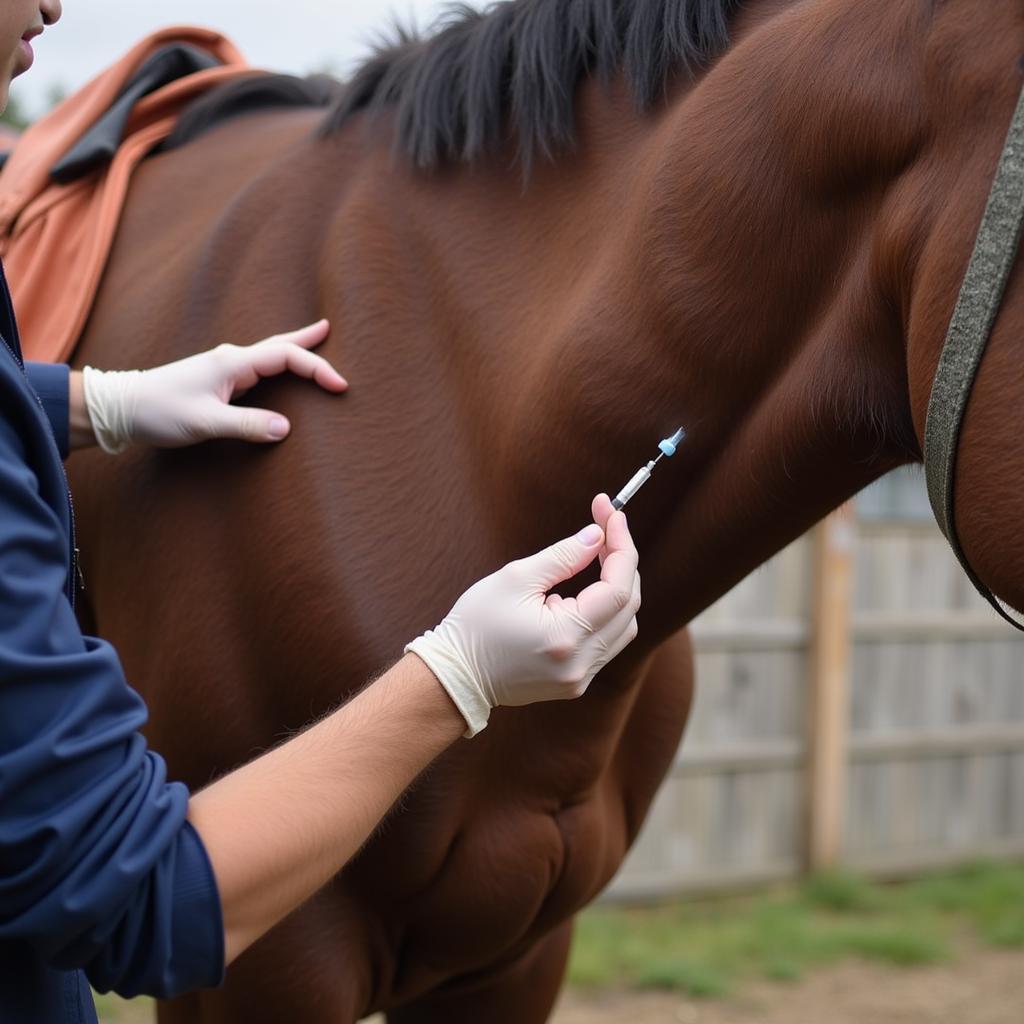Botulism Vaccine For Horses is a crucial part of a comprehensive equine healthcare plan. This potent neurotoxin, produced by the bacterium Clostridium botulinum, can cause severe paralysis and even death in horses. Understanding the importance of this vaccine and incorporating it into your horse’s vaccination schedule is vital for their well-being. botulism in horses vaccine
Understanding Botulism in Horses
Botulism is a serious and often fatal disease affecting horses. It occurs when horses ingest the botulism toxin, which can be present in contaminated feed, water, or even wounds. The toxin blocks nerve impulses, leading to muscle weakness and paralysis. Early signs can include difficulty swallowing, drooling, and weakness. As the disease progresses, horses may experience difficulty breathing and ultimately succumb to respiratory paralysis.
Why the Botulism Vaccine for Horses is So Important
Vaccinating your horse against botulism is a critical preventative measure. While not 100% effective, the vaccine significantly reduces the risk of your horse contracting this devastating disease. It stimulates the horse’s immune system to produce antibodies against the botulism toxin, helping to protect them from its harmful effects. The botulism vaccine is particularly important for horses living in areas where botulism outbreaks are common or for horses exposed to potential sources of the toxin, such as contaminated feed or water.
“Botulism can be devastatingly quick,” explains Dr. Emily Carter, DVM, equine specialist. “Vaccinating is the best way to protect your horse from this often-fatal disease.”
Types of Botulism Vaccines for Horses
There are several types of botulism vaccines available for horses, including those that protect against specific types of botulism toxin. Your veterinarian can recommend the most appropriate vaccine for your horse based on their individual needs and risk factors. Common types include bivalent and trivalent vaccines, which protect against two and three types of botulism toxin, respectively.
Administering the Botulism Vaccine
The botulism vaccine for horses is typically administered intramuscularly, usually in the neck or hindquarters. The initial vaccination series usually involves a primary dose followed by a booster several weeks later. horse muscles neck Annual boosters are then recommended to maintain immunity. Your veterinarian will develop a customized horse vaccine schedule for your horse based on their age, health status, and risk factors.
When Should You Vaccinate Your Horse Against Botulism?
The timing of the botulism vaccine is crucial for ensuring optimal protection. Foals are typically vaccinated starting at around six months of age. Adult horses should receive annual boosters, particularly those living in high-risk areas. horse vaccination chart Consult your veterinarian to discuss the best vaccination schedule for your horse.
“Regular vaccinations are a cornerstone of equine preventative care,” advises Dr. James Miller, PhD, Equine Immunology Researcher. “The botulism vaccine plays a critical role in safeguarding horses against a highly potent and dangerous neurotoxin.”
 Administering the Botulism Vaccine to a Horse
Administering the Botulism Vaccine to a Horse
Conclusion
The botulism vaccine for horses is an essential part of responsible horse ownership. This preventative measure offers significant protection against a potentially fatal disease. By understanding the importance of the botulism vaccine and working with your veterinarian to develop an appropriate vaccination schedule, you can help ensure the long-term health and well-being of your equine companion. 6 way vaccine for horses
FAQ
- How often should my horse receive the botulism vaccine? Annual boosters are generally recommended.
- Are there any side effects associated with the botulism vaccine? Side effects are rare and typically mild, such as temporary swelling or soreness at the injection site.
- Can foals receive the botulism vaccine? Yes, foals can typically start receiving the vaccine around six months of age.
- What are the symptoms of botulism in horses? Symptoms include muscle weakness, difficulty swallowing, drooling, and difficulty breathing.
- Is the botulism vaccine 100% effective? No vaccine is 100% effective, but the botulism vaccine significantly reduces the risk of the disease.
- What should I do if I suspect my horse has botulism? Contact your veterinarian immediately.
- How is botulism transmitted in horses? Horses typically contract botulism by ingesting the toxin, which can be present in contaminated feed, water, or wounds.
Need more help? Contact us at Phone: 0772127271, Email: [email protected] Or visit us at: QGM2+WX2, Vị Trung, Vị Thuỷ, Hậu Giang, Việt Nam. We have a 24/7 customer service team.